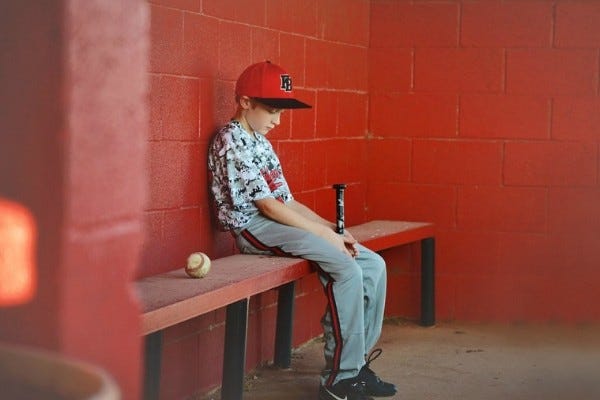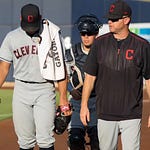Parents and Coaches,
This week I recorded a version of a written article I wrote back in 2019. Not only is it still relevant, it’s something I personally still struggle with and see every single week on every single team.
Please take the time to read below or listen above, and I’d ask that you share this either on social media or with 2 or 3 other parents or coaches today!
Thank you for being a part of the Elbow Up community, and if you don’t get these in your inbox each week, what are you waiting for? 😉
Eight year old Tommy steps into the on deck circle and takes a couple of swings, halfway distracted by the young child crying in the stands through the fence.
One of his coaches (who is also his dad) looks over at him.
“You’re dropping your hands. Come on, swing like you will in the game.”
Tommy tries to refocus but before he’s able to swing, the previous batter is out and he’s up to bat. He trots out to the batter’s box, excited for the opportunity to hit!
“Back up in the box! Look at your feet! Now get that elbow up!”
Swing and miss.
“You’re pulling your head out. Keep your head down”
Foul ball.
“You’re stepping out. You have to step to the pitcher or you’re never going to hit it!”
Swing and miss. Strike three.
Tommy trots back to the dugout only to be met by his coach (and dad) who repeats everything he said over the past three pitches.
Tommy’s disheartened. Not because he struck out. Because he just received 7 different instructions during a live at bat, he struck out in front of everyone, and worst of all he feels like he’ll never be able to do everything his dad told him all at once.
It’s a vicious cycle that will only get worse.
Over-coaching is one of the worst things you can do as a parent or coach. It’s something I’ve fought myself for years.
It really becomes debilitating to the player and amplifies any failure they may experience on the field.
At this age, if they don’t have it, or know it, before they get into the batter’s box, they’re not going to.
Keep in mind, there are certainly times to teach during a live game. Situational learning happens in a game because it’s very difficult to replicate in practice, especially at a young age.
Working on who covers second, who the cut man is, where to throw the ball in a certain situation. Those are all things I may mention to a player between batters or innings in a positive way so they get feedback as soon as it happens.
Hitting and pitching mechanics aren’t that easy to learn during the middle of a game. These are things that should be practiced over and over before the game, so that when they get in the game it’s a learned movement or skill that comes natural.
I’m actively looking for sponsors for the weekly podcast. I’ll be picky and only partner with those I feel will serve my audience well. If you or someone you know would be a good fit, reply to this email and let me know!
How to Avoid the Over-Coaching Trap
First, just stop. And relax. Let the kids enjoy the game. Remember my number one goal? If they aren’t enjoying the game, they’ll lose interest and never get any better.
Secondly, focus on one small thing at a time (but not during the game!) and practice it over and over and over. I’ve often wondered how many of those dads and coaches barking multiple commands during an at-bat actually spend several hours a week working on those same commands.
If you practice your spelling for 5 minutes each week, how is your child going to do on the spelling test?
Baseball is no different. If you go to one team practice in a week, and then spend 5 minutes talking about the swing in the car on the way home, how can you expect different results?
Focus on one small incremental improvement at a time, and actually spend time working on it.
Third, realize and come to grips with the fact that your child is 6, or 8, or 10, or 12. They’re still kids and they don’t pick up everything quickly. Many baseball movements are advanced, and can be difficult to replicate even for kids who are advanced learners.
I consider my own son to be very smart. He’s like a sponge and remembers everything. But as a 7 year old, he doesn’t have the body control to execute some of the baseball movements we work on.
That’s okay because one day he’ll have that body control. And as long as I haven’t pushed him away from the game, he’ll figure it out.
Next time you catch yourself over-coaching, just stop - sit back, relax, and enjoy the game! Work on incremental improvements during the week, and watch your son get better over time!
If you’re not getting my updates delivered straight to your inbox, you’re missing out!
I hope you found today’s edition useful. If so, would you please share it, as well as click on the heart below?
You can also reply directly to this email with feedback, or get the conversation going below by adding to the comment section.
And until next time, GET YOUR ELBOW UP!













Share this post